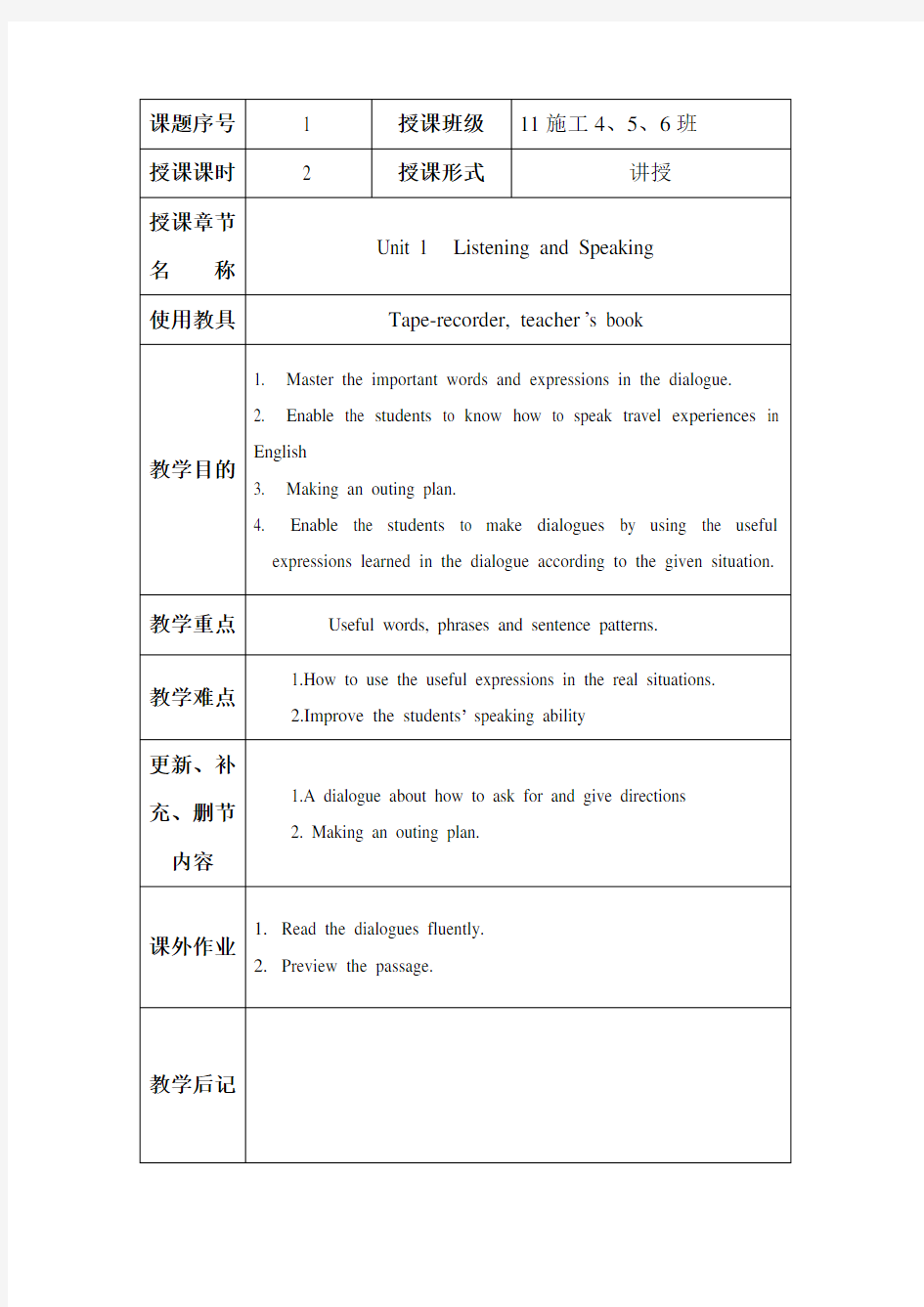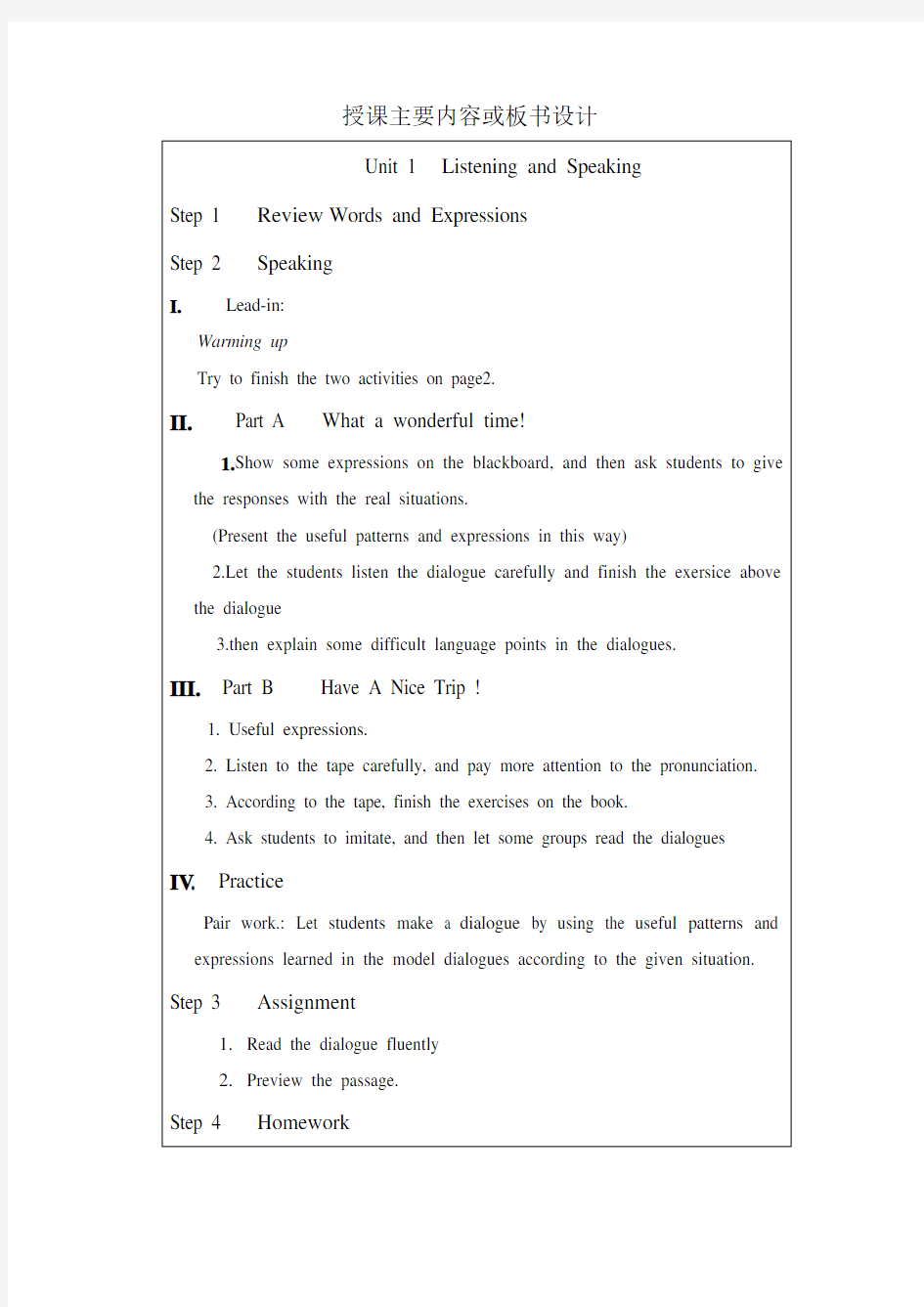Unit 1What a wonderful time!


授课主要内容或板书设计
Unit 1 Listening and Speaking
Contents:
This is the first period of Unit 1. The students have learned some words about kinds
of travel.
Analysis of the students:
The students can use some simple sentences to talk about kinds of travel. In this class, they will learn more about intreseting travel plans.
Teaching Aims:
1. Master the important words and expressions in the dialogue.
2. Enable the students to know how to speak travel experiences in English
3. Making an outing plan.
4. Enable the students to make dialogues by using the useful expressions learned in the dialogue according to the given situation.
Teaching aids: multimedia, pictures, computers and so on.
Teaching Procedures:
Step I Warm up
Activity 1: Read the pictures in the box. Where do you think these places? What activities can people do at each place?
注:1.新课导入部分可以带领学生学看图,根据图上标明的不同地方做出回答,以便了解一些旅游胜地。
Activity 2: Why do you travel? Tick your reasons and add reasons that are not listed below..
注:将学生分成两人或三人小组。确定组内每个成员的任务,通过简单的问答和
替换练习,可以让学生熟悉第一个活动中图片上所有的运动。
Step II Listening and speaking
A What a wonderful time!
Activity 1: Where did Lily probably go in the winter vacation?Tick (ˇ) your guess. Then listen to the conversation to check your prediction.
Activity 2: Listen again. Then underline the sentences talking about a travel destination in the conversation.
注:让学生注意听力中的语音语调,基础好的同学可以模仿。
Activity 3: Match the instructions with the correct pictures.
Activity 4: Work in pairs and complete the conversation below.
B Have A nice trip !
Activity 5:Which of the following preparations will you make before you start travelling?Tick your answer.
Activity 6:Listen again and circle the best answer.
Activity 7: Listen again and tick the information you hear.
Activity 8: Talk with your partner. Use the expressions you’ve learned on break-time activities.
授课主要内容及设计
Unit 1 Reading and Writing
A journey to Hong Kong Disneyland
Contents:
This is the first period of Unit 1. The students have learned some words about kinds of travel.
Analysis of the students:
The students can use some simple sentences to talk about kinds of travel. In this class, they will learn more about intreseting travel plans and reading abilities.
Teaching Aims:
1. Master the important words and expressions in the text.
2. Master some useful words, phrases and sentence structures learned in the passage.
3. Train the students’ reading ability.
Teaching aids: multimedia, pictures, computers and so on.
Teaching Procedures:
Step I Warm up
1.Review the knowledge of introducing in last class.
Learn new words in the vocabulary and ask Ss to read them
Step II Pre-reading tasks
The pre-class tasks are as follows:
Activity 1: Read the text and underline the activities the writer and his classmates do on the spare-time activities day.
(give 4 mins to discuss and sum up )
注:可以让学生重点阅读第一段,同时训练学生细致观察的能力。
Step III Reading the text.
Activity 2: Read the text quickly and try to catch the main idea of the text. You may use your skills of skimming and scanning and have a discussion with your partner.
Later I will ask two of you to share your opinions.
Activity 3:Read the first paragraph again and underline the topic sentence.
Activity 4:Choose the best topic sentence for the paragraph below.
注:是学生了解段落主要大意,训练学生概括段落大意的能力。
Activity 4: Read the text again and find out the grammar.
a.At the back of ….在。。。后面get excited ; become excited。
b.短语“be tired of”后加名词或动名词,表示“厌倦了,厌烦了做某事”
c.现在分词做伴随状语的特点是:她所代表的动作或状态是伴随着句子谓语动
词的动作而发生或存在的。伴随状语的逻辑主语一般情况下必须是全句的主语。
例如:He sat in the armchair, reading an interesting magazine.
d.Run around and play with water 是省略了to的动词不定式充当watch的宾语补
足语。动词不定式做宾语补足语,补不定式符号to可以省略的动词有:see, watch, hear, observe, feel,look at等感官动词及使役动词。
e.Slow down 放慢速度quality time 黄金时光,珍贵时光
f.While 在文中用作并列连词,意思是“但,却,然而”,表示对比或与前面的
情况相反。例如:She drinks black coffee while I prefer it with cream.
Step IV Writing
Activity 7:Read the paragraph below and write a topic sentence for it. Then exchange your topic sentence with others.
Step VI Homework
授课主要内容或板书设计
Unit 1 Language in use
Contents:
This is the three period of Unit 1.
The students have learned some phonetics and grammar .
Analysis of the students:
The students can use some simple sentences to talk about the phonetics and grammar. In this class, they will learn more about intreseting knowledge and abilities. Teaching Aims:
1. Master the phonitics and rules of three phonetics.
2. Enable the students to know how to tell from the three phonetics
3. Master the exclamations for ability.
4. Train the students’ grammar ability.
Teaching aids: multimedia, pictures, computers and so on.
Teaching Procedures:
Step I Warm up
1.Review the knowledge of introducing in last class.
2.Review the phonetics and grammar of last book.
Step II Language in use
A Phonetics
Activity 1: Listen and read the following phonetics and words.
注:本活动列出三个音标以及对应的常见单词,让学生掌握辅音发音规则和拼写规则。
Activity 2:Read the following words. Put them in the proper basket according to the
pronunciation of the endings.
注:可以鼓励学生自己主动尝试纠正发音,掌握发音技巧。
Activity 3: Play a game to add more words and ask ss to tell from them.
Activity 4: Make up a tongue twister to develop ss’ interest.
B Grammar
感叹句:
感叹句由“How + 形容词/ 副词” 和“What + 名词”构成,后面要用“!”。可以省略主语和谓语。
1.How +形容词/ 副词。
1 How + 形容词+主+谓+···!
How cold it is today !
How clever the boy is !
2 How +副词+主+谓+···!
How fast she runs !
How hard the girls are working !
3 How + 形容词+a / an + 名词+主+谓+···!
How clever a boy he is !
How funny an elephant it is !
2.What + 名词。
1 What + a / an +形容词+可数名词单数+主+谓+···!
What a fine day it is today !
What an honest man his father is !
2 What +形容词+可数名词复数+主+谓+···!
What tall trees they are !
What good students the boys are !
3 What +形容词+不可数名词+主+谓+···!
What cold water it is !
What delicious milk it is !
C V ocabulary
Activity 7:Learn the directions on a compas. And then complete the paragraph below with the directions.
Activity 8:Complete the sentences with the correct words from the box. Change the form if necessary.可以让学生在练习前回顾一下所给单词,并在核对答案时说出整句的含义。
Step IV Homework
授课主要内容或板书设计
Unit 1 Real life skills and Further reading Contents:
This is the four period of Uni1. The students have learned about how to practise the knowledge into real life and train reading ability.
Analysis of the students:
The students can use some simple sentences to talk about how to practise the knowledge into real life and train reading ability. In this class, they will learn more about intreseting spare-time activities and reading abilities.
Teaching Aims:
1. Master the important words and expressions in the text.
2. Master some useful words, phrases and sentence structures learned in the passage.
3. Train the students’ practise and reading ability.
Teaching Procedures:
Step I Warm up
Lead-in:
Activity : Rivew the phonetics and grammar of last lesson.
(give 4 mins to discuss and sum up )
Step II Real life skills
Activity 1: Read the four detailed information of the tour packages arranged by Spring Tour Agency. Then introduce them to your classmates. The leaving dates of each tour are marked on the calendar.
在活动前要求学生预习,通过网络、图片或书籍杂志等途径查找表格中要求的地名的英文表达。
Activity 2: Ask at least three of your classmates about their wishes on a coming spring outing. You may ask the following questions and take down the answer in the table. Activity 3: The following are the important school events one shouldn’t miss in March. Mark the dates on the calendar in Activity 1.
Activity 4: Finish the following Spring Outing Plan for your class. Answer the following questions first.
Step III Further reading
Backpacking
1.Pre-reading tasks
The pre-class tasks are as follows:
Activity 1: Discuss the expirence of free entertainment to arouse ss’ interest.
(give 4 mins to discuss and sum up )
2.Reading the text.
Activity 2: Read the text quickly and try to catch the main idea of the text. You may use your skills of skimming and scanning and have a discussion with your partner. Later I will ask two of you to share your opinions.
Activity 3:Read the first paragraph again and underline the topic sentence.
Activity 4:Choose the best topic sentence for the paragraph below.
注:是学生了解段落主要大意,训练学生概括段落大意的能力。
Step IV Practise
Step V Homework
